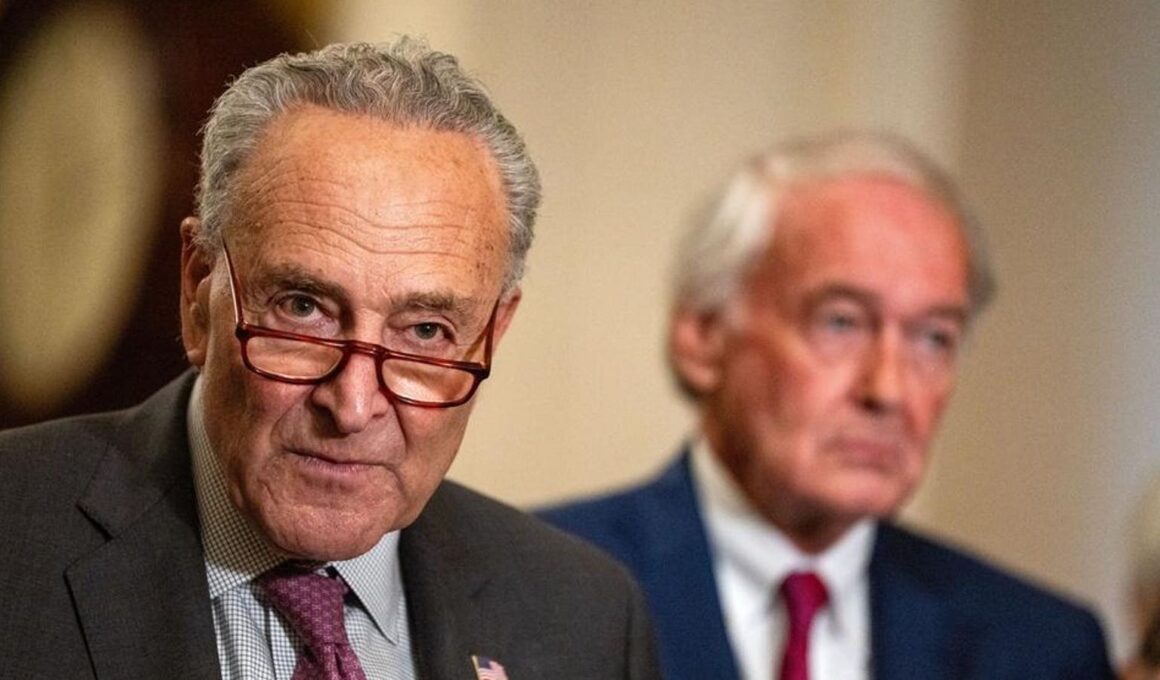Topline
Senate Majority Leader Chuck Schumer, D-N.Y., will introduce legislation Thursday that would undo the Supreme Court’s recent ruling giving former President Donald Trump some immunity from criminal prosecution—but it and other proposed Supreme Court reforms are unlikely to pass a divided Congress.
Senate Majority Leader Chuck Schumer, D-NY, takes questions from reporters at the Capitol on July 30 … [+]
Key Facts
The “No Kings Act,” which is co-sponsored by more than two dozen Democratic senators, would specify that presidents and ex-presidents, as well as vice presidents, are not immune from criminal prosecution for acts they take while in office.
It would also emphasize that only Congress, rather than the court, “has the authority to determine to which persons the criminal laws of the United States shall apply.”
The legislation comes weeks after the Supreme Court ruled former presidents cannot be criminally prosecuted for “official acts” they took while in office, narrowing the scope of the federal indictment against Trump for trying to overturn the 2020 election.
Schumer’s bill would ensure the Supreme Court cannot overturn the legislation, specifying that while presidents or ex-presidents can challenge the law in court if it’s enacted, any lower court ruling can’t be appealed to the Supreme Court and the federal appeals court in Washington D.C. is the highest court that can issue a ruling on its legality.
President Joe Biden similarly endorsed a constitutional amendment on Monday that would undo the Supreme Court’s ruling and specify presidents don’t have criminal immunity for their official acts.
Regular legislation is easier to pass than a constitutional amendment, which would only be able to pass with a two-thirds majority in both chambers of Congress and approval by at least three-quarters of states.
Get Forbes Breaking News Text Alerts: We’re launching text message alerts so you’ll always know the biggest stories shaping the day’s headlines. Text “Alerts” to (201) 335-0739 or sign up here.
What To Watch For
While less of a longshot than a constitutional amendment, Schumer’s legislation is still unlikely to make it through Congress. It would need 60 votes in the Senate and a majority of votes in the GOP-controlled House, where Speaker Mike Johnson, R-La., has previously cheered the immunity ruling and said any efforts to reform the Supreme Court are “dead on arrival.” Republicans have broadly opposed any legislation that would reform the Supreme Court or respond to its rulings, claiming Democrats are pushing reforms as partisan retaliation against rulings the left doesn’t like. The bill would likely face long odds even if Democrats win control of Congress in November, unless Senate Democrats were to get rid of the filibuster rule so the bill could pass with a majority vote.
Crucial Quote
The Supreme Court’s immunity ruling “threw out centuries of precedent and anointed Trump and subsequent presidents as kings above the law,” Schumer said in a statement Thursday, arguing “given the dangerous and consequential implications of the Court’s ruling, legislation would be the fastest and most efficient method to correcting the grave precedent the Trump ruling presented.” “With this glaring and partisan overreach, Congress has an obligation—and a constitutional authority—to act as a check and balance to the judicial branch.”
What We Don’t Know
How the immunity ruling will continue to affect Trump’s criminal cases. The ex-president has argued his conviction on 34 felony counts in Manhattan should be thrown out because some evidence used at trial would be exempted under the court’s ruling, and his sentencing in that case was postponed until September while the immunity dispute is hashed out. Trump has also claimed immunity from his case in Georgia for trying to overturn the 2020 election, which will likely resume next year after an appeals court weighs in on whether Fulton County District Attorney Fani Willis should be kicked off the case. While his criminal case for allegedly withholding White House documents was dismissed in district court, Trump is also likely to claim immunity if the case gets revived by an appeals court, as he’s argued he’s immune from prosecution because he “declassified” documents he brought back to Mar-a-Lago with him while he was still in office.
Key Background
The Supreme Court ruled 6-3 in July in favor of Trump’s criminal immunity, declaring ex-presidents have at least some immunity after both federal district and appeals courts both ruled against Trump. The court maintained ex-presidents don’t have immunity for “unofficial acts” that weren’t part of their duties as president, but they cannot be prosecuted for any “official acts” that were within the scope of their work as president. Democrats have widely decried the ruling, which has further inflamed existing criticism on the left about the 6-3 conservative court amid a string of controversial rulings and ethics scandals. In addition to backing a constitutional amendment on immunity, Biden also came out in favor Monday of imposing 18-year term limits for justices and forcing the court to follow a binding code of ethics—which marks a major step for the president, who has historically been resistant to any major court reforms. Democratic senators have introduced legislation imposing an ethics code and term limits on the court, but the measures are deeply unlikely to pass.
Further Reading









